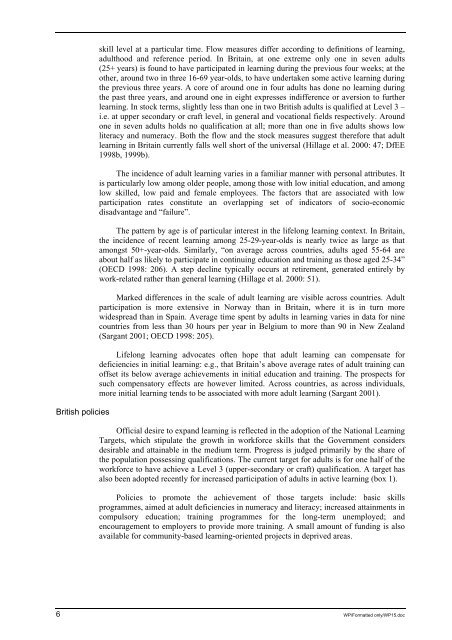Lifelong learning - International Labour Organization
Lifelong learning - International Labour Organization
Lifelong learning - International Labour Organization
You also want an ePaper? Increase the reach of your titles
YUMPU automatically turns print PDFs into web optimized ePapers that Google loves.
British policies<br />
skill level at a particular time. Flow measures differ according to definitions of <strong>learning</strong>,<br />
adulthood and reference period. In Britain, at one extreme only one in seven adults<br />
(25+ years) is found to have participated in <strong>learning</strong> during the previous four weeks; at the<br />
other, around two in three 16-69 year-olds, to have undertaken some active <strong>learning</strong> during<br />
the previous three years. A core of around one in four adults has done no <strong>learning</strong> during<br />
the past three years, and around one in eight expresses indifference or aversion to further<br />
<strong>learning</strong>. In stock terms, slightly less than one in two British adults is qualified at Level 3 –<br />
i.e. at upper secondary or craft level, in general and vocational fields respectively. Around<br />
one in seven adults holds no qualification at all; more than one in five adults shows low<br />
literacy and numeracy. Both the flow and the stock measures suggest therefore that adult<br />
<strong>learning</strong> in Britain currently falls well short of the universal (Hillage et al. 2000: 47; DfEE<br />
1998b, 1999b).<br />
The incidence of adult <strong>learning</strong> varies in a familiar manner with personal attributes. It<br />
is particularly low among older people, among those with low initial education, and among<br />
low skilled, low paid and female employees. The factors that are associated with low<br />
participation rates constitute an overlapping set of indicators of socio-economic<br />
disadvantage and “failure”.<br />
The pattern by age is of particular interest in the lifelong <strong>learning</strong> context. In Britain,<br />
the incidence of recent <strong>learning</strong> among 25-29-year-olds is nearly twice as large as that<br />
amongst 50+-year-olds. Similarly, “on average across countries, adults aged 55-64 are<br />
about half as likely to participate in continuing education and training as those aged 25-34”<br />
(OECD 1998: 206). A step decline typically occurs at retirement, generated entirely by<br />
work-related rather than general <strong>learning</strong> (Hillage et al. 2000: 51).<br />
Marked differences in the scale of adult <strong>learning</strong> are visible across countries. Adult<br />
participation is more extensive in Norway than in Britain, where it is in turn more<br />
widespread than in Spain. Average time spent by adults in <strong>learning</strong> varies in data for nine<br />
countries from less than 30 hours per year in Belgium to more than 90 in New Zealand<br />
(Sargant 2001; OECD 1998: 205).<br />
<strong>Lifelong</strong> <strong>learning</strong> advocates often hope that adult <strong>learning</strong> can compensate for<br />
deficiencies in initial <strong>learning</strong>: e.g., that Britain’s above average rates of adult training can<br />
offset its below average achievements in initial education and training. The prospects for<br />
such compensatory effects are however limited. Across countries, as across individuals,<br />
more initial <strong>learning</strong> tends to be associated with more adult <strong>learning</strong> (Sargant 2001).<br />
Official desire to expand <strong>learning</strong> is reflected in the adoption of the National Learning<br />
Targets, which stipulate the growth in workforce skills that the Government considers<br />
desirable and attainable in the medium term. Progress is judged primarily by the share of<br />
the population possessing qualifications. The current target for adults is for one half of the<br />
workforce to have achieve a Level 3 (upper-secondary or craft) qualification. A target has<br />
also been adopted recently for increased participation of adults in active <strong>learning</strong> (box 1).<br />
Policies to promote the achievement of those targets include: basic skills<br />
programmes, aimed at adult deficiencies in numeracy and literacy; increased attainments in<br />
compulsory education; training programmes for the long-term unemployed; and<br />
encouragement to employers to provide more training. A small amount of funding is also<br />
available for community-based <strong>learning</strong>-oriented projects in deprived areas.<br />
6 WP/Formatted only/WP15.doc

















